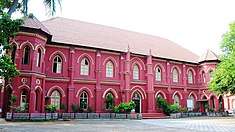Edappally Raghavan Pillai
Edappally Raghavan Pillai (30 May 1909 – 4 July 1936) was an Indian poet of Malayalam literature and a close associate of Changampuzha Krishna Pillai.[1] The pair, the front-runners of romanticism in Malayalam, was considered by many as the Shelley and Keats combination of Malayalam poetry. Kesari Balakrishna Pillai compared Pillai to the Italian poet, Giacomo Leopardi.
Edappally Raghavan Pillai | |
|---|---|
| Born | May 30, 1909 Elamakkara, Edapally, Ernakulam, Kerala, India |
| Died | July 4, 1936 (aged 27) Kollam, Kerala, India |
| Occupation | Poet, writer |
| Nationality | Indian |
| Notable works |
|
| Relatives |
|
Biography

Raghavan Pillai was born on May 30, 1909 at Elamakkara, near Edapally in Ernakulam district of the south Indian state of Kerala to Pavathu Neelakanda Pillai and Kalyani Amma, in a family with limited financial means.[2] His mother died when he was young and his father, who was an alcoholic, remarried;[3] he could not get along well with his step mother.[4] His early schooling was at a local school in Ponekkara after which he completed middle school from the English School in Edapally Chuttupadukara before completing his high school education from a school in Cheranellore and later at St. Albert's HSS, Ernakulam; he passed the 10th standard examination only on the second attempt. During this period, he worked as a private tuition teacher and he fell in love with one of his students who came from a rich family in Edapally. The girl's parents soon came to know about it and forced him to leave Edapally.[3]
Pillai moved to Thiruvananthapuram where he stayed with a friend by name M. Balakrishnan Nair and worked at various establishments viz. Bhashabhivardhini Book Depot, Sreemathi weekly and Kerala Kesari magazine as well as at a local grocery shop as their accountant.[2] He also tried unsuccessfully to pass Vidwan examination. When Kerala Kesari was closed down, he moved to Kollam where he was accommodated by V. M. Narayana Pillai, a known lawyer and a relative of the girl he loved.[4] It was here he came to know about the marriage of the girl when the lawyer received her wedding invitation. On July 4, 1936, when the lawyer was away from home to attend the wedding of the girl, Pillai, aged 27, bathed himself clean and wore a jasmine garland before committing suicide.[5] His body was found the next morning, hanging from a tree.[6]
Legacy
Raghavan Pillai was a close friend of Changampuzha Krishna Pillai and the friends were referred to as Edapally poets[7] or as the twins of Edapally.[8] Both the poets were exponents of romantic poetry[9] which earned them the moniker, Shelley and Keats combination of Malayalam poetry.[10][11] It is believed that the pastoral play, Ramanan, by Changampuzha is an elegy based on the life and death of his friend Raghavan Pillai.[1]
Kesari Balakrishna Pillai likened Pillai to the Italian poet, Giacomo Leopardi.[12] Pillai's body of work comprises Sudha, Chillikkashu, Thushara Haaram (1935), Nava Saurabham (1936), Hridhaya Smitham (1936) and Maninaadham (1944), the last one considered by many as his best work.[13] Ramanan has since been adapted as a feature film, into a Kadhaprasangam by Kedamangalam Sadanandan and into a music album.[7] A memorial has been built for the poet by the public at Mulamkadakam in Kollam, the place where Pillai committed suicide.[14]
Farewell poem
Pillai wrote a poem, Naalathe Prabhatham, (Tomorrow's Sunrise) the day before his death and sent it to Malayalarajyam press with instructions to publish it the next day.[3] Maninadam, The poem he wrote shortly before his death opens as:[15]
മണിമുഴക്കം! മരണദിനത്തിന്റെ |
The bell tolls; It is the sweet knell |
Changampuzha wrote a short poem, The Broken Flute, mourning the loss of his friend which reads as:[8]
നീലക്കുയിലെ, നിരാശ്രയാം നിൻ നീറും മനസ്സുമായ് നീ മറഞ്ഞു |
O blessed nightingale You have vanished with your scourging despair |
Selected works
- Thushara Haaram (1935)
- Nava Saurabham (1936)
- Hridhaya Smitham (1936)
- Maninaadham (1944)
- Edappally Raghavan Pillayude Krithikal
References
- George, K. M. (1992). Modern Indian Literature, an Anthology: Surveys and poems. Sāhitya Akādemī. ISBN 978-81-7201-324-0.
- "Biography on Kerala Sahitya Akademi portal". Kerala Sahitya Akademi portal. 4 March 2019. Retrieved 4 March 2019.
- "Edappally Raghavan Pillai - Veethi profile". veethi.com. 4 March 2019. Retrieved 4 March 2019.
- "Memories of Edappally, poet of love, turn eight decades". Mathrubhumi. 5 July 2016. Retrieved 4 March 2019.
- Sandy (4 July 2017). "Edappally Raghavan Pillai – The poet who foresaw his death". My Words & Thoughts. Retrieved 4 March 2019.
- Saccidānandan (1996). Gestures: An Anthology of South Asian Poetry. Sahitya Akademi. pp. 134–. ISBN 978-81-260-0019-7.
- Vijayakumar, B. (17 April 2010). "RAMANAN 1967". The Hindu. Retrieved 4 March 2019.
- Es Guptannāyar (2001). Changampuzha. Sahitya Akademi. pp. 27–. ISBN 978-81-260-1292-3.
- O. N. V. Kurup (2005). This Ancient Lyre: Selected Poems. Sahitya Akademi. pp. 24–. ISBN 978-81-260-1791-1.
- Das, Sisir Kumar (1995). A History of Indian literature. Sahitya Akademi. ISBN 978-81-7201-798-9.
- Sisir Kumar Das (2005). History of Indian Literature: 1911-1956, struggle for freedom : triumph and tragedy. Sahitya Akademi. pp. 207–. ISBN 978-81-7201-798-9.
- "Poetry – The Second Generation of Romantics". Public Relations Department, Government of Kerala. 4 March 2019. Archived from the original on 27 September 2011. Retrieved 4 March 2019.
- "List of works". Kerala Sahitya Akademi portal. 4 March 2019. Retrieved 4 March 2019.
- "Kollam, a melting pot of traditions, tastes". OnManorama. 4 March 2019. Retrieved 4 March 2019.
- K. M. George (1992). Modern Indian Literature, an Anthology: Surveys and poems. Sahitya Akademi. pp. 789–. ISBN 978-81-7201-324-0.
Further reading
- S. Guptannāyar, Changampuzha, Sahitya Akademi (2001). ISBN 81-260-1292-7, ISBN 978-81-260-1292-3
- Rekshadas D (1978). "The poetry of Edappally Raghavan Pillai - A Study (full text)". Shodhganga. University of Kerala. Retrieved 4 March 2019.
External links
- "Portrait commissioned by Kerala Sahitya Akademi". Kerala Sahitya Akademi portal. 4 March 2019. Retrieved 4 March 2019.